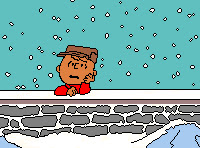
Saturday, December 30, 2006
My New Year's Project

Friday, December 29, 2006
I Feel ... Sad
James Brown is one of those great entertainers who was able to transcend boundaries of nation, culture, and genre. You don't have to come from the Projects to appreciate songs like I Got You (I Feel Good) or Papa's Got a Brand New Bag, Pt. 1. Nor do you have to be African-American to identify with Say It Loud (I'm Black and I'm Proud), Pt. 1, as the movie The Commitments so wittily pointed out.
The news reports say that Brown had an impact on a wide range of popular musical genres including soul, funk, rock and roll, and even rap. I don't know to what extent this is true, but I do know one thing -- hearing James Brown belt out "I feel good!" is a thrill no matter how many times I hear it.
Rest in peace, James. You don't have to work so hard any more.
Thursday, December 28, 2006
Great Debates: Wounded Knee
On this day, 116 years ago, American soldiers perpetuated a massacre of Lakota Sioux that resulted in the deaths of approximately 300 Lakota, most of them women and children. Colonel Forsyth, the commander of the 7th Cavalry, alarmed the Lakota with his clumsy attempts to disarm them. Shooting broke out and many on both sides fell from gunshot wounds. Up to half of the Lakota casualties resulted from victims freezing to death in the cold December night. Twenty soldiers won the "Medal of Dis-Honor" in the fight.
Tuesday, December 26, 2006
Highlander
 This is a photograph of one of my 54mm plastic soldiers. It is from the Armies in Plastic kit of highlanders that served in the 1882 Tel-El-Kebir campaign in Egypt (kit #5416). As is the case with other AiP kits, the figures have a real retro feel to them and look as if they are old-fashioned tin soldiers.
This is a photograph of one of my 54mm plastic soldiers. It is from the Armies in Plastic kit of highlanders that served in the 1882 Tel-El-Kebir campaign in Egypt (kit #5416). As is the case with other AiP kits, the figures have a real retro feel to them and look as if they are old-fashioned tin soldiers.This soldier is from the "Bogmont Highland Regiment". In other words, the figure does not reflect an historically accurate uniform but rather is intended to create a nice looking highlander in all his scarlet Victorian glory.
Monday, December 25, 2006
Merry Christmas, No Matter How It's Said

Fröhliche Weihnachten (German)
Feliz Navidad (Spanish)
Merry Keshmish (Navajo)
Joyeux Noel (French)
Miilad Majid (Arabic)
Shuvo Naba Barsha (Bengali)
Feliz Natal (Portuguese)
Chung Mung Giang Sinh (Vietnamese)
Mele Kalikimaka (Hawaiin)
Subha nath thalak Vewa (Sinhalese)
God Jul (Norwegian)
Meri Kirihimete (Maori)
Buone Feste Natalizie (Italian)
Shub Naya Varsh (Marathi)
Cristmas-e-shoma mobarak bashad (Farsi)
Zalig Kerstfeast (Dutch)
Gun Tso Sun Tan'Gung Haw Sun (Cantonese)
Melkin Yelidet Beaal (Amharic)
Kala Christouyenna (Greek)
Jwaye Nowel (Haitian creole)
Sung Tan Chuk Ha (Korean)
Mitho Makosi Kesikansi (Cree)
Veselé Vánoce (Czech)
Selamat Hari Natal (Indonesian)
Boze Narodzenie (Polish)
Shub Naya Baras (Hindi)
Nathar Puthu Varuda Valthukkal (Tamil)
Srozhdestvom Kristovym (Ukrainian)
Maligayamg Pasko (Tagalog)
Geseënde Kersfees (Afrikaans)
Hyvaa joulua (Finnish)
Meri kurisumasu (Japanese)
Nollaig Shona Dhuit (Irish Gaelic)
Sunday, December 24, 2006
Great Debates: Christmas Eve or Christmas Day?
In the interest of transparency, I have to reveal that I grew up in a household that was firmly committed to the Christmas Eve camp. Our usual drill was to leave the home to attend the Christmas Eve service. Invariably, my father forgot something in the house, so he went back in to collect it while my mother, my siblings, and I sat in the car waiting for him. The service would drag on, the ride back home would take forever, and then we would enter the house -- only to discover that Santa had been there before us. Somehow, the floor beneath the Christmas tree was littered with gifts by the time we got back.
In time, I came to realize that many people were not blessed by an early visit from the jolly fat man. My less fortunate friends had to wait the entire night to discover what Santa Claus brought them. I was never sure of the reason, but I suspected it had something to do with going to that evening service on Christmas Eve.
Now that I am much older, I think I would change sides if I had children. As much as I enjoyed opening gifts on the 24th, I think it is even better on Christmas morning. It gives children an extra evening of anticipation. It gives adults something to do between Christmas dinner and the groaning board of desserts laid out by overly generous hosts.
In the long run, it doesn't really matter whether you are an Evist or a Dayist -- Christmas is more than just a day to open gifts. Whomever you are, wherever you live, I hope you have a great day celebrating according to your traditions.
Merry Christmas to all.
Saturday, December 23, 2006
Happy Festivus
Friday, December 22, 2006
Today's Playlist - Gabriel Faure
Faure was a major figure in the world of French classical music in the late 19th and early 20th centuries. He was a composer, an organist and pianist, a teacher, and the director of the Paris Conservatory. Faure was one of the foremost composers of his time, but this week I concentrated on listening to Opus 48 and Opus 50.
Requiem in D Minor (Opus 48) is one of my favourite classical pieces of all time. Most requiems are written to commemorate a specific individual, but Faure stated that he composed his requiem "for the pleasure of it". Although he composed it after the death of his father, Faure explained the piece's significance in slightly different terms:
“Everything I managed to entertain by way of religious illusion I put into my Requiem, which moreover is dominated from beginning to end by a very human feeling of faith in eternal rest.”
The piece runs about 35 minutes long and consists of seven movements, including my two favourite parts -- the Piu Jesu and In paradisum, which is traditionally included in the Order of Burial instead of a Mass for the dead. The libretto is sung entirely in Latin, but the words and music blend so well that the voices become another instrument.
Faure once commented that someone described the Requiem as a "lullaby of death". If you listen to Opus 48 you will agree with this observation, but you will probably join me in feeling that the Requiem is also a lullaby of life. Like many other beautiful works of art, the piece provides reassurance that there is a meaning and a purpose to life that we often only suspect exists.
Opus 50, the Pavane in F Sharp Minor, provides me with a similar glimpse at the "face of God", if you will. A pavane (or pavan) is a slow, stately dance that originated in the Spanish court in the 17th century. Although Faure's Pavane was meant for orchestra and not dancing, it retains the elegance one would expect from a court dance.
Pavane in F Sharp Minor reminds me of nothing so much as the ocean. It begins softly -- almost too quiet to hear -- and builds to a series of musical climaxes that rise and fall like the ebbing and flowing of the tides. As was the case with the Requiem, there is something comforting about Opus 50, something that provides an intimation of the existence of God.
Thursday, December 21, 2006
Charlie Brown Sans Linus


Wednesday, December 20, 2006
All the News That Ain't Really News
One of the big stories in last evening's news was the story that Tara Conner, the reigning Miss USA, has been given a second chance by ubiquitous ham Donald Trump. The lovely Ms. Conner, or so it has been claimed, had sullied her title by drinking whilst under age, doing drugs, and making out with Miss Teen USA. This behaviour clearly violated the high standards that the American public expects its beauty queens to uphold.
To be honest, I don't know which was more disconcerting -- the fact that the potential firing of a beauty queen was considered news or the fact that the potential firing of an American beauty queen was considered news on a Canadian network. Given the truly important issues facing Canadians -- Afghanistan, globalization, and the environment spring immediately to mind -- I find it hard to believe that anyone cares if Miss USA was seen kissing Miss Teen USA.
You know, sometimes I feel as if I am watching the decline and fall of my civilization, but at least I can rest assured that the news media will help keep beauty pageant winners accountable to the general public.
Tuesday, December 19, 2006
News from Borneo
- two tree frog species, including one with green eyes;
- six species of Siamese fighting fish;
- a catfish with suction cups on its belly to anchor it to rocks;
- the world's second tiniest fish that measures less than a centimetre in length;
- twenty-two other species of fish;
- sixteen new species of ginger;
- three species of trees; and
- one broad leaf plant species.
- 260 insect species;
- fifty new plants of various types;
- thirty new freshwater fish species;
- five species of crabs;
- seven frog and one toad species;
- six species of lizards; and
- one species of snake.
Maintaining this incredible diversity -- including those species that have not yet been identified -- may come down to people deciding that a one centimetre long fish is more important than cheap rubber or palm oil. The trouble is, we humans don't have a great track record of doing what is right for our fellow species on the planet.
Monday, December 18, 2006
Now Its Time to Emancipate Minds
At least, it became a thing of the past in a legal sense. I am not entirely sure that it has become a thing of the past in a psychological sense.
I am reading a business book on organizations and their values. It is written by an American-born consultant who has lived in Canada for years. I know the author. He is intelligent, articulate, and genuinely interested in people. He is liberal enough to pass as a Canadian. He also refers to "race" in his book, even though race as a biological concept does not exist. (He uses it in the sense that people should be judged according to merit, not gender, age, or other characteristics, including race.)
The case of Michael Richards is an indication of how deeply ingrained the divide between white and black is in the American psyche. I have no idea how heckling can lead to racist, violent imagery, but that is exactly what happened. I somehow doubt Richards would have responded with comments about invading small countries and marching in unison if the hecklers had been of German stock. The fact that Richards used the "N" word is bad; the manner in which he came to use it is even worse.
A final bit of evidence of the deep psychological wound that still exists can be found in the December 4th issue of Macleans magazine, which profiled Senator Barack Obama of Illinois. The article addressed whether or not Obama, who has a white mother and an African father, is "black enough" to be considered black.
Apparently America cannot get beyond the "one-drop rule" (which states that if a person has even one drop of non-white blood, he or she is to be considered coloured). I think this is a shame -- and a danger. As someone who likes Americans and wishes them well, I think it is time that they emancipated their minds from this artificial construct of race. It is time to fully accept that all men and women are created equal.
Happy Belated Anniversary, Wilbur and Orville
Saturday, December 16, 2006
Glücklicher Geburtstag, Ludwig!
Had he lived, Beethoven would be 236 today, which would also make him the world's oldest person.
Take that Mozart!
Friday, December 15, 2006
Happy Hanukkah
Hanukkah is more than just the commemoration of an historical event -- it is a metaphor for the rededication of one's life to a higher spiritual calling. Christmas, which is a mere ten days away, is a similar call to reflexion and rededication. Perhaps this year, people will heed the call of the season. Perhaps this year, so will I.
Death of a Dolphin
The species, which lived in the Yangtze River, had been under pressure from hunting, the destruction of its environment, and the loss of food sources. Construction of the Three Gorges Dam had a huge impact on the degradation of the dolphin's habitat, while noise pollution from increased waterborne traffic led to collisions with ships.
The last sighting of a Chinese River Dolphin, or baiji, was made in September, 2004. The event that caused Xinhua to declare the species extinct was a recent 6-week survey of the Yangtze River in which no dolphins were sighted. Some experts argue that this was simply a result of bad weather and murky water conditions, but even if there are survivors, there are probably too few left to keep the species viable.
The passing of the baiji is the first time a cetacean species has been exterminated entirely as the result of human activity. Its relative, the Chinese White Dolphin which lives in the waters off Honk Kong, is also under serious pressure, with a population estimated at less than 150. It is likely to share the same fate as the baiji.
Thursday, December 14, 2006
It's Beginning to Look a Lot Like ... Easter?
I don't know if this is evidence for global warming or not. I realize that it has, on occasion, still gotten below freezing at night. On the other hand, I find it worrisome when I am able to see buds on the branches of trees on the 14th of December.
I do know one thing -- a lot of people will not get into the full Christmas spirit until the winter weather comes.
Tuesday, December 12, 2006
My Playlist
- The Queen of African Pop - Brenda Fassie (1964-2004)
- The Best of Miriam Makeba, The Early Years
- Spirit of African Sanctus, The Original Recordings by David Fanshaw (1969-1973)
- The Very Best of Africa
- The Best of Africa, The Millennium Collection
- Women of Africa (a Putomayo presentation)
The great thing about African music is its wide range. There are traditional songs, dance music, and fusions of jazz and traditional music. The next group of CDs I listen to will broaden the range, because I will be listening to artists such as Angelique Kidgo, the Kutis, Youssou N'Dour, and Ali Farka Toure.
Sunday, December 10, 2006
Christmas Shopping Blues
Friday, December 08, 2006
... Or is it?
Winter's Here ...
Wednesday, December 06, 2006
In Memorium - Les Femmes de Montreal
By the time the gunman finally shot himself, he had killed 14 women and wounded nine women and four men. His reason for the violence? He had applied for admission to the engineering school, but had been declined. He blamed this on affirmative action and on the women's movement in general. The murders were his response.
Today, people across Canada will gather to remember the victims of the Montreal Massacre, as well as other victims of violence against women. Let us remember them by name:
Genevieve Bergeron
Helene Colgan
Nathalie Croteau
Barbara Daigneault
Anne-Marie Edward
Maud Haviernick
Maryse Laganiere
Maryse Leclair
Anne-Marie Lemay
Sonia Pelletier
Annie St-Arneault
Annie Turcotte
Barbara Klucznik-Widajewicz
Tuesday, December 05, 2006
Happy Ninja Day
The ninja, as you may or may not know, were warrior families who practiced a particularly stealthy form of warfare in samurai-era Japan. They are often held as models for secretive special operations soldiers.
The Day of the Ninja was created in 2003 to celebrate the ninjas. According to the official Day of the Ninja website ( http://dayoftheninja.com/index2.html), appropriate activities include dressing like ninjas and spreading ninja-related information on the internet. This is my contribution.
I realize that this posting is a bit late in the day, but celebrating your ninja-ness on the 6th is just as ninja as celebrating on the 5th -- since nobody will be expecting it! In case you don't know how to be a ninja, check out any of these sites:
http://www.ninjaburger.com/employment/manual/ninjamask.jpg (how to make a ninja mask)
http://www.folds.net/tutorial/models/shu_2_piece/shu_2_piece_diagrams.html (how to make a paper throwing star)
http://www.penofchaos.com/ninjas/ (a website en francais)
http://quizilla.com/users/aeonite/quizzes/Are_You_a_Ninja (an on-line quiz to determine if you are a ninja)
Monday, December 04, 2006
My Celebrity Sighting
As he walked past me, I notice that the tall man looked kind of familiar. A second later I realized that the man who had grabbed the bottled water was none other than wrestler Hulk Hogan. The whole encounter took less than 10 seconds and then it was over, but I was left with one overpowering thought -- I thought he was taller.
I mean, I am a little over six feet tall, but Hogan couldn't have been more than two-and-a-half inches taller than me. He was still impressive -- especially considering he is 53 now -- but he looks way bigger on television. I wonder if that is true for all professional wrestlers.
Sunday, December 03, 2006
Tripping Down Memory Lane
Some of the cassettes were in rough condition. A few did not work at all. Others squeaked so much that I couldn't hear the music. One got tangled up in the workings of the stereo. Most did work, however, and it was a lot of fun reacquainting myself with old friends like Harry Belafonte and Miriam Makeba, Clannad, the Wolfe Tones, and 90% of my blues and jazz collection.
I suppose I could do the same with my vinyl LPs, but I don't have a turn table. Good thing I was smart enough to record my albums to cassette when I had the chance.
Friday, December 01, 2006
Book Review - Voyage of the Turtle
These massive beasts -- males can weigh up to a ton -- have been on earth for over 100 million years, yet today they face mixed fortunes. In the Pacific, leatherback populations are under siege and numbers are dropping. In the Atlantic and Caribbean, on the other hand, populations are on the rebound after years of decline.
I love animals. I especially love frogs and reptiles, but I had never given sea turtles much thought before reading Safina's book. Now that I have read it, I am amazed that I had not paid much attention to sea turtles before. After all, they are magnificent animals capable of voyages across vast oceans that stagger the imagination. In many locations, however, they are facing extinction.
Fisheries -- especially shrimp and longline fisheries -- have played their role in the turtles' decline. In some cases, turtles are actively sought as prey; in others, they are the accidental by-catch of factory fishing. Some of the saddest passages in the book are when Safina describes the fate of turtles entangled in nets.
The major cause of concern is not the fishing industry, however, but rather a concerted assault on their eggs. Whether it is degradation of nesting sites or poaching of eggs, the smaller number of females who come ashore to breed are finding it difficult to replentish their race. Little hatchlings that can fit into a man's palm have always had a tough time making it to the water's edge, but the odds against survival seem higher than they have ever been.
Voyage of the Turtle contains scenes so achingly sad to make you cry. It also contains stories of unnecessary loss that will make you mad. But the book is not all doom and gloom. Safina leavens his tale with stories to give you hope for the future survival of these beautiful, gentle giants of the sea.
I have never seen a sea turtle, but now that I have read Voyage of the Turtle I long to do so. Until then, I will say a prayer for the little hatchlings that struggle to make it to the ocean and I'll say a prayer for a species like mine that exterminates these wonders of creation with so little thought.
Voyage of the Turtle: In Pursuit of the Earth's Last Dinosaur
Carl Safina
Henry Holt and Company, New York 2006
ISBN: 0-8050-7891-6
Wednesday, November 29, 2006
And Two Makes Forty-Four
The families say the things military families are supposed to say, things like, "He died doing what he loved doing." I am sure that is true. Why else would someone put themselves in harm's way to face death in someone else's country? The soldiers must have truly loved being in the army and serving as their government saw fit to deploy them.
The Afghanistan mission is a tough sell. Canadians are torn between wanting our troops home without further losses, being proud of the job they have accomplished, and worrying that the war may not be as much of a Dudley Do-Right mission as it was initially portrayed. No doubt historians five decades from now will find similarities between Afghanistan and Korea, the last major conflict in which Canadians saw combat.
I am torn too. I am proud of how well our troops have carried themselves. I know it is politically incorrect to say this, but I am pleased to see that they are still effective at the arts of war, especially after the neglect of successive governments. I am sad that so many of them have died.
Most importantly, I sometimes wonder if the end result is worth it. Who knows if democracy will really take root in Afghanistan? Who knows if the lives of women and children (and men, for that matter) will ever change for the better? Who knows if a hundred years from now the Afghan elders will tell their grandchildren of the times when the brave freedom fighters first chased out the Russians and then chased out the NATO armies? Who knows if the fighting will ever end?
Monday, November 27, 2006
The Deed is Done
I don't know what to make of this. I doubt it will appease separatists in Quebec, who see Quebec as an independent country. I doubt it will please many "average Canadians" either, although I may be wrong on that count.
I do know that the move seems to be a step backwards to a time where ethnicity defined nations. To me, Canada has always risen above mere parochial ethnicity. I am Canadian first, of German descent second (or even third, given my strong identification as a North American).
Perhaps the one thing I find the most ironic is that the Quebecois were never really a "nation" in a true sense. Up until 1759. Quebec was a colony of a nation, France, but it was not a nation in and of itself. The French government called the shots -- and paid the bills. But irony and politics seem to go hand in hand, so perhaps I should not be surprised.
Sunday, November 26, 2006
What About That Weather, Eh?
I find this fascination with weather interesting, but somewhat inexplicable. Perhaps because we are a nation of extreme weather changes, we are at times preoccupied with whether or not precipitation has fallen, and in which forms. On the other hand, perhaps we are like strangers on an elevator who, pressed for conversation, settle on the weather as a safe topic.
Friday, November 24, 2006
Intimations of Winter
The blades of grass were white with frost. The leaves that littered the ground were coated with a thin crystal crust that sparkled in the sun like diamond dust. The sidewalk revealed the treads of those who'd been there as if Mother Nature's CSIs dusted the pavement for shoe prints. The warmth of my breath caused wisps of steam to accompany my whistling.
I popped into the Tim Horton's to pick up a coffee.
When I exited the coffee shop, the sun had been out long enough to melt the magic away. The grass was wet. The leaves were soggy. The sidewalk looked as if it had been rained on. The only steam was the heat that escaped when I lifted the lid from my coffee cup.
Wednesday, November 22, 2006
A Nation at Last, As If It Really Matters
Supposedly this is a big thing, perhpas even historic in nature. After all, Quebec separatism is predicated on the idea that the Quebecois form a unique nation. I am not sure it really is a big thing, though.
As a citizen of what some have described as the world's first post-nation state, it seems to me that the question of nationhood is rather outdated. Canada is a country, not a nation. We are a community of communities, rather than a homogeneous enclave with a single ethnicity, a single religion, and a single culture. The same can be said for Mali, for Australia, for Costa Rica, and for France.
It is definitely the case for the modern Quebec where multilingual Montrealers speak sentences that mix French, English, and other languages with ease. Quebec is no longer the homogeneous conservative Catholic society that it was in the years before the cultural revolution. It may be true that Quebeckers identify themselves in narrower terms than most Canadians do as citizens of a province, but then again, Vancouverites take pride in their unique identity as do citizens of my own beloved Hog Town.
Recognizing Quebec as a nation is a nice way of saying "We recognize that you are special, with a unique history", but does it really mean much in practical terms? I guess we will find that out in the months and years to come. I am sure that the separatists will continue to press for independence, even though the world seems to be becoming more integrated than ever before in the empire of global capitalism.
Perhaps that makes the Quebecois the Luddites of Canada. Demands for a separate nation state may just be the last ditch gasp of a society of diehard romantics, a society in which the nation is more important than the state.
Monday, November 20, 2006
The Rime of the Lower Mainlanders
These days, the people in the lower mainland of British Columbia must feel some kinship with the Ancient Mariner from Coleridge's poem. Despite living in the wettest environment in Canada, nearly a million British Columbians remain under orders to use bottled water or to boil tap water. Worst of all, officials still do not know when they will lift the ban on drinking tap water.
The problem stems from the storms that ravaged the area recently. The Capilano and Seymour watersheds were hit hard by the storms, and the water is considerably murkier than normal. Although nobody has reported falling ill due to drinking the water and despite the fact that health officials have not found any evidence of bacteria in tap water, they are still concerned that drinking the water may lead to gastrointestinal illness. The ban, therefore, remains.
There is one piece of good news, though. Local coffee shops are back in business after having been temporarily shut down. If you know Vancouver, you'll understand what an important step this is on the road to normalcy.
Sunday, November 19, 2006
A Grey Day in Canada
It's not that I have anything against the Canadian Football League. Truth be told, I prefer the CFL game to the product put out by the National Football League down south. Having said that, "prefer" is a relative term, and preferring the CFL over the NFL is like preferring the cold over the flu. As much as I hate to admit it, football just doesn't appeal to me.
I played football once. I was in Grade 11 and I had an incredible need to fit in with the other kids in school. Since I was a big kid, everyone always urged me to go out for the gridiron gang and that year I decided to go for it. The gym coach who had constantly urged me to go out for the team was ecstatic. My friends on the team were happy that they were going to be bulking up the line.
Imagine everyone's surprise when they discovered that the tall kid with broad shoulders who looked like a football player was so lousy at the game! I like to joke that I was a fourth string player on a three string team, but the truth is that I barely made the fourth string. My biggest contribution was to intimidate the other team with my size when we took to the field for pre-game calisthetics.
I don't regret my football career. I may not have been very good, but I learned a lot about life by playing football. Perhaps the biggest lesson I learned was that I don't enjoy football enough to waste a good part of the day watching the Grey Cup.
Friday, November 17, 2006
Do I dare to eat a peach?
Maybe I should blame it on T. S. Eliot. You see, I read The Love Song of J. Alfred Prufrock on my lunch break and, as always, the poem left me feeling a little empty. I suppose you could say it made me feel like a "hollow man" after I had read it.
I don't know what it is, but so many phrases reverberate in my soul when I read Prufrock. Today it was the following passage that spoke to me:
There will be time, there will be time
To prepare a face to meet the faces that you meet;
There will be time to murder and create,
And time for all the works and days of hands
That lift and drop a question on your plate;
Time for you and time for me,
And time yet for a hundred indecisions,
And for a hundred visions and revisions,
Before the taking of tea.
I just watched a couple of television shows. One is fairly good. One is filler, shlock fit only to kill an hour until my preferred show comes on. Neither is capable of affecting me the way these nine lines did. Both are forgotten a mere half hour after their completion. Eliot, on the other hand, haunts the chambers of my very being.
There will be time, there will be time to prepare a face to meet the faces that you meet. Did Eliot imagine that all these years later we would live in a world that encourages us to prepare faces to deal with one another? Would he be sad to discover that each of us dons masks each day, as if there is no other way to face the world?
Time for you and time for me, and time yet for a hundred indecisions, and for a hundred visions and revisions, before the taking of tea. Imagine the odds that Eliot would foresee my life in such detail. How comforting to know that he could imagine a world with such possibilities that the greatest challenge is to choose the dream to pursue.
I wish I could be like Prufrock, able to say, "I heard the mermaids singing, each to each", even if they did not sing for me any more than they sang for him. But today, I do not hear mermaids. Today, I only hear Prufrock as he leads me on through half-deserted streets.
Thursday, November 16, 2006
Colour Me Lilac
Our colour code is a combination of positions and departments. Team Leaders, for example, wear grey lanyards while management wears red or black depending upon their level. Similarly, Information Technology employees wear gold, while support departments wear burgundy. In my particular case, my department colour is the lilac lanyard of Training and Human Resources and my position colour is black. I normally wear lilac. And therein hangs a tale.
I have spent enough time with new employees to understand how red or black lanyards can affect training sessions. Believe it or not, they sometimes end discussions before they begin. Something as simple as a red or black strip of cloth can make people nervous, so when I am training the black lanyard comes off.
Many of the new employees know me as a trainer for the first two weeks of their careers. It is only once they are out of the training room and onto the floor that they learn my true role in the organization. I guess that makes me a bit like Batman or Superman. Call me TrainingMan, member of the League of the Lilac Lanyard.

Monday, November 13, 2006
Remembrance Day, 2006
I understand his position, even if I cannot agree with it. Even when it is necessary -- and sometimes it is necessary -- war is an evil, destructive, inhuman undertaking. But the young man was missing the point. Remembrance Day is not about war, at least not entirely. Remembrance Day is about being a member of society.
Every man or woman who agrees, voluntarily or not, to serve the state in its armed forces undertakes a social compact with their society. The warrior agrees to obey orders, undertake hardships, and, if necessary, to pay the supreme price of death or maiming. In return, the state is to care for the wounded and the families of the dead. The rest of us, the vast masses who make up the rest of society, are expected to make sure the warriors are not forgotten.
That is the purpose of Remembrance Day. The grotesque anonymity of the killing fields of Flanders, Verdun, and the Somme seared a broad and deep scar on the psyche of our societies. The survivors instinctively understood that plaques and resting places for "unknown soldiers" were not enough to meet the requirements of the social compact. Mere statuary was not enough -- living memories were required.
By pausing for one brief hour every November, we keep the social compact. The dead held up their part of the bargain, whether their graves are known or whether they are buried in tons of Flemish mud or hidden in the carcass of a plane awaiting discovery in the jungle. Remembrance Day is how we, members of society, keep our end of the bargain.
The poppies we wear, the silence we observe, the tears that form in the corners of our eyes when the piper plays The Flowers of the Forest or when the aging veteran reads from the roll of honour in a halting voice -- these are the true memorials to those who kept their end of the bargain. They are the means by which we keep faith with those who died.
Friday, November 10, 2006
Movie Review - Borat: Cultural Learnings of America
In case you are one of the few people in North America who has not heard of the Borat phenomenon, the movie is a mock documentary detailing the travels -- and travails -- of a fictional reporter from Central Asia. It is your standard "innocent abroad" story with one exception -- Borat is anything but innocent.
Borat Sagdiyev is a sexist, anti-Semitic, homophobic moron. He believes women are fourth class citizens, after men, horses, and dogs. He thinks nothing of asking a gun shop owner which firearm is best for shooting Jews and readily believes that the Jewish owner of a bed-and-breakfast is trying to poison him when she brings him a sandwich. He is crude, rude, and lewd. He is also riotously funny.
The film is based on a character created by Sasha Baron Cohen for Da Ali G Show, a popular HBO series. Like Cohen's other two avatars -- Ali G, the proverbial "wanksta", and Bruno, the fashionista from Austrian Gay TV -- Borat employs the same technique to get laughs: make outrageous statements to unsuspecting people and see how they react.
I first became familiar with Borat when traveling in the United Kingdom, and I have to say he has always been my least favourite of Cohen's characters. I understand that he is trying to disempower racism and prejudice by showing it in all its magnificent idiocy. I just don't think the character is as funny as the other two. Having said that, Borat: Cultural Learnings was pretty funny.
Whether he was attending a fancy dinner party in a southern mansion, taking driving lessons, or wrestling nude with his producer --don't ask, words can't describe it-- Borat is hilarious. The responses he generates from his victims are often even more hilarious, if sometimes frightening. The government of Kazakhstan may not agree, but Borat is the funniest thing to come out of Central Asia since . . . well . . . Borat is the funniest thing to come out of Central Asia.
But something really funny happens during the movie. Despite holding up a mirror to the individual and corporate prejudices of everyday Americans, they come out as a pretty nice bunch of people. Most are happy to help Borat learn more about their country and their culture, and some display graciousness above and beyond the call of duty. There may be prejudice lurking just below the surface, but there is also sweetness and generosity. And that, perhaps, is the most important lesson that Borat has to teach us.
Wednesday, November 08, 2006
Decision Day Down South -- The Results
- the Democrats control the House of Representatives (Congress)
- the Democrats have a possibility of controlling the Senate, once the votes are counted
- the Secretary of Defence, Donald Rumsfeld, felt obliged to resign
I guess you could say that President Bush has his very own "minority" government. At best, it is going to be very difficult for him to get legislation passed, especially since he has been so partisan over the past six years. At worst, he faces being hamstrung.
Tuesday, November 07, 2006
Decision Day Down South
Sunday, November 05, 2006
A Sunday Morning Kind of Thing
I should be in church right now. I'm not saying that because I feel that it is the right thing for people to do; I'm saying it because it is the right thing for me to do. I feel a real need to be part of a community of faith, a community that reaches into the past and extends into the future. In other words, I prefer a church that cherishes its traditions, focuses on the present, and embraces what is to come.
I've tried going to church over the past two years. My wife and I started going to a little Anglican church in the country that was founded back in 1847. I figured it would be nice to be involved with a church that had a sense of community and a sense of the past. Unfortunately, it was just my luck to pick an Anglican parish whose incumbent has nothing but contempt for tradition.
I realize that absenting myself from church is a poor approach to dealing with my spiritual life, but I must admit that I never feel so close to the Devil as I do when I am attending services at this particular church. My wife still attends, though, so I spend my Sunday mornings sipping herbal tea and listening to Mahalia Jackson, Faure's Requiem, and Gregorian chants.
Saturday, November 04, 2006
My Imaginary Readers Write
Dear SilentGriot,
Aren't you being too hard on Barry Manilow? After all, he writes the songs that make the young girls cry.
Girl Against Griot
Dear GAG,
And he also sings the songs that make me cry, especially his version of Can't Take My Eyes Off of You. Although, to be fair, I did find his "dance" moves to the song entertaining. Apparently, when he appeared on American Idol this last season (in the highest rated episode, no less), he gave them the benefit of his experience and in exchange they taught him some "hep new moves".
Dear SilentGriot,
I thought you were in favour of artistic expression. What's wrong someone liking a song and singing it?
A Concerned Reader
Dear Concerned Reader,
I have absolutely nothing against people liking songs so much that they sing them. In fact, that is why God invented shower stalls and road trips in cars. When you are driving down Yonge Street (with the window closed) sing as heartily as you want, whether you sound good or not. Just don't foist a tortured version of what was once a beautiful song on the paying audience like the two artistes in question have.
Dear Font of All Knowledge,
Who died and made you the Music Pope? Who gave you the right to say people are not allowed to cover songs?
Just Wondering
Dear JW,
I didn't even know the job was open, but since it is, I humbly accept your nomination. We can dispense with all the formality and you can just address me as "Your Griotness". To answer your question, I am not opposed to people covering other artists' songs. I just wish they would cover songs well.
Take one of the songs in question, for example. My all time favourite version of People Get Ready is not the original, but rather a version done in the 1960s by the little-known UK group Jimmy James and the Vagabonds. Unlike Rod Stewart, JJ & the V did not cover the song to prove they had soul -- they covered the song because they had soul. If you can track down a copy of the Vagaonds version and compare it to the Stewart version you will hear a purity on the former that is missing from the latter.
Other cover versions that I can recommend are:
- Rock the Kasbah by Rachid Taha, an Arabic version of the old Clash anthem
- Hurt by Johnny Cash
- Ring of Fire by Zimbabwe's Bhundu Boys
- Afrika by Tukuleaur, a bilingual French-Toucouleur reworking of a rather weak Toto original
- Spit on a Stranger by Nckel Creek
- One by Johnny Cash
- Puff the Magic Dragon by the Loop, a frenzied reworking of the children's classic by a friend and former co-worker
Nuff said!
Keep those imaginary emails and comments coming.
Friday, November 03, 2006
Cease and Desist Order #1
From: the SilentGriot
cc: the music-loving public
Subject: Stop the Atrocities!
Okay, guys, I get it. You are not just rock stars, you are "artistes". (Well, in your case, Barry, you are not just a pop star -- "rock star" doesn't really describe you.) That is why you insist on inflicting your insipid versions of other people's songs on us, isn't it? I mean, why else would you insist on covering songs that other people have done better, especially classic songs from the past?
Rod, I blame you for this. I agree, there is a timeless beauty to the old standards from the days before rock and roll. Even though I did not like piano lessons when I was a child, I derived a great deal of pleasure playing Deep Purple or Gershwin's Our Love is Here to Stay. Hell, I even sang along sometimes. I understand your appreciation of the old standards. But really, Rod, did you have to record your Great American Songbook albums?
Come to think of it, did you really have to record Broken Arrow, People Get Ready, or What a Wonderful World either? Don't get me wrong, I love each of these songs. Its just, you don't do them very well. Your versions of these songs are tired, uninspired, and, quite frankly, soulless. Considering the oomph you put in your best works -- your original works when you were starting out -- you really run the risk of becoming a caricature of the entertainer you used to be.
And Barry, what sort of cockamamy thought process resulted in your take on the Greatest Hits of the Sixties? Did you really think that the world needs a weak-voiced, poorly phrased version of Can't Take My Eyes Off of You? Does anyone need any version of What the World Needs Now Is Love?
Gentlemen, if you are such fans of the music as you say you are, please limit yourselves to either listening to them in private or to recommending the original versions to interested parties. Please do not continue to commit the musical equivalent of the Texas Chainsaw Massacre on these beautiful songs.
Wednesday, November 01, 2006
Dia de los Muertos
When the Spanish landed in Mexico five centuries ago, the natives had already been observing Dia de los Muertos for over three millenia. As they converted to Catholocism, the native Mexicans melded the old ways with the very Christian holiday of All Saints' Day. Today, the Day of the Dead is considered an important expression of Mexican culture.
Mexicans observe the holiday by cleaning and even decorating the graves of loved ones. They often leave offerings of food, alcohol, candy, and toys. They may also make altars for these offerings in their homes and offices (even government offices). All in all, they display a distinct lack of dread about death and a definite sense of communicty.
As interesting as I find the Dia de los Muertos observations, I could never follow them myself. My family has been mobile -- we travelled from Saskatchewan to the United States to British Columbia. My three siblings live in different towns in BC than my parents; I live in Ontario. Neither my parents nor my siblings live in the same province where my grandparents are buried. I don't even know what cemeteries my grandparents rest in.
I am not Mexican, so I could never really celebrate the Day of the Dead, even if I knew where my grandparents were buried. What I can, however, learn from Mexican culture is how to celebrate the lives of the people who have gone away. And so I will spend this evening thinking about the ones who are no longer with us: my grandparents, my uncles, my aunts, my cousins, and my father-in-law. In my heart I am leaving you flowers and food and alcohol.
Monday, October 30, 2006
Magic Mushrooms and Giant Spiders
Another interesting page on the NG site is a little bit grosser. Now, I don't mind spiders of the ordinary kind, but the goliath birdeater tarantula quite literally makes the hairs on my neck stand up. Not only is the spider quite large -- so are its teeth. You can find a video of the spider at: http://news.nationalgeographic.com/news/2006/10/061027-tarantula-video.html. The squeamish should be warned, however, that the video contains acts of violence against bugs and mice.
Sunday, October 29, 2006
Thoughts as I Listen to Music
I am not one of those technologically obsessed people who purchase the latest toys, only to discard them when something better comes along. I do not own an iPod. In fact, I've never even owned a Walkman, much less a Discman. I kept buying cassette tapes long after CDs showed up on the scene.
Having said that, I am not a Luddite. I have both a digital camera and a digital video camera. I burn CDs to my computer to listen to while I work. I enjoy technology when it can work for me and make my life richer.
So why am so melancholy as I sit here listening to my music? Is it because I am listening to mandolin-filled tunes that speak of sadness and heartache? Is it because I just realized how much technology has changed since my youth? Or is it perhaps simply the fact that I am sitting alone in my home office listening to songs that were meant to be heard by a live audience?
Friday, October 27, 2006
36 Minutes in the Griot's Life
The show began at 7:05, when I first noticed the sun rising in the east.
When I returned to the living room at 7 :26, the sky was beginning to transform itself.
Seven minutes later -- at 7:33 -- the sky had begun the metamorphosis from black to orange.
What a change a minute made. By 7:34, the sky had turned into a peach bellini.
At 7:35, the skyline had transformed itself to a living version of a 19th Century English landscape painting.

Within another minute, the sky had continued its fluid dance of colours and shadows and the cloud layers parted and reformed.

By 7:40, the sky was a sea of oranges and yellows.

When I left to go to work at 7:41, the sky had transformed itself yet again, and all the blues and greys had departed.
Thursday, October 26, 2006
Me and B. B. King
I recognize the song -- Every Day I Have the Blues -- and I silently sing along with the man on stage. When the song ends, B. B. King looks over to the side of the stage and catches sight of me.
"Hey, man," he shouts out to me, "How you been keeping?"
"I've been fine," I reply.
"How's the diabetes?" he asks with the concern of an old friend.
"It's under control," I lie. "But I still hate testing my blood," I decide to tell a truth, "Makes my fingers real sore."
B. B. King grins at me. "I told you the brand to use, man."
The great blues hero turns to the audience and announces in a grand voice, "Folks, it is my genuine pleasure to introduce a dear friend and a sometime colleague of mine."
He waves me on, so I join him on stage. He asks if I brought my guitar, and I tell him I didn't. (To be perfectly honest, I don't even own a guitar.) When he hears this, he hands me the famous Lucille and he asks me to play the folks my signature song.
As I take his place on the stool, B. B. King stands by a mike and softly says, "There's some that says the best blues are Chicago blues. There's some that says the best blues are Mississippi delta blues. Well, folks, the man you're about to hear ain't never been to Chicago and he doesn't come from the Mississippi delta. Put your hands to together and welcome my good friend, Little Jimmy Phillips, king of the Mississauga delta blues."
At this point I started laughing and woke myself up from the dream. Too bad -- I'll always wonder how the Mississauga delta blues compare to the ones from Mississippi.
Wednesday, October 25, 2006
News from the Zoo

Sad news from the Toronto Zoo. Kunik the polar bear, who died in September, fell victim to West Nile Virus. The 26 year old bear likely contracted the disease from a mosquito bite. According to Zoo officials, it was the first known case of a polar bear succumbing to the disease.
I know that there are many critics of zoos, but I personally enjoy going to the Toronto Zoo. People like me are highly unlikely to get to see animals like Kunik in the wild. Still, it is ironic that Kunik lived a relatively long life in captivity, only to be killed by a disease he would never have caught in his natural habitat.
Tuesday, October 24, 2006
Insomnia

Sometimes, I cannot get to sleep.
Other times, I wake up and I cannot fall back to sleep.
Occasionally, I just lie in bed and imagine that I am living somewhere exotic and tropical. Most times, I just wait to fall asleep.
But there are some times when I take advantage of my insomnia and take pictures like this photo of a couple of ugly monkey salt and pepper shakers.
It doesn't do anything to cure my insomnia, but it makes me feel as if my sleeplessness has not been a total waste of time.
Monday, October 23, 2006
A Mouse's Eye View of the World
 If you read this blog regularly, you know I recently bought a new digital camera. What you may not know is that it has changed the way I see things.
If you read this blog regularly, you know I recently bought a new digital camera. What you may not know is that it has changed the way I see things.Take this picture, for example. The local Weston Produce grocery store has fall items for sale, including pumpkins and bales of hay. In the past, I would have noticed the bales of hay and thought back upon a childhood where hay bales were not just a seasonal accoutrement.
When I saw the bales last week, I immediately wondered what it would look like "on film", and once I brought my camera to the store, I began to look at the bale of hay as if it were an environment on its own. I may not know exactly how a mouse sees the world, but I think that, at least part of the time, it looks like this.
Saturday, October 21, 2006
The View from Here
Thursday, October 19, 2006
Movie Review - The Departed
The movie is a masterpiece. When it ended, I said there for a minute while the credits rolled just so that I could catch my breath from the incredible performances. Mark Walberg in particular gave an award-worthy performance.
I am not going to discuss the story line. I would rather you see the movie for yourself. The movie is extremely violent at times, but when it is over, the you will not be thinking about the violence -- you will be thinking about the magnificent movie you just saw.
Wednesday, October 18, 2006
Mein Geständnis
Mein Familienname ist englisch, aber meine Familie ist deutsch. Meine Mutter war in Deutschland geboren. Mein Vater war in Kanada geboren, aber seine erste Sprache war Deutsch. Meine Eltern sprechen Deutsch -- ich nicht.
Wenn Sie mit mir auf Deutsch sprechen, ist meine Antwort "Ich spreche nicht Deutsch" oder "Geben Sie die gummi Bären frei. Unten mit den Plastiktaschen!"
Sunday, October 15, 2006
Requiem for a Lost Soul

89 years ago today, a 41 year old exotic dancer and courtesan named Margaretha Geertruida Zelle was executed by a French firing squad. Better known by her stage name -- Mata Hari -- the Dutch dancer had been convicted of spying for the Germans.
There is something incredibly sad about Margaretha's life story. A woman of mixed Dutch-Javanese descent, she was born in the Netherlands and moved to Java at 18 with her naval officer husband. They had two children, but she lost custody when the couple divorced.
Margaretha moved to Paris after the divorce, where she eventually became famous -- or infamous -- as an exotic dancer and a courtesan. Although she was well-known for displaying her body, one of the many sad legends about Mata Hari says that even though she was skilled at making love, she was so sensitive about her small breasts that she never uncovered them for her lovers.
As can be expected from an engaging, exotic courtesans, Margaretha had relationships with a number of important men from a number of countries. Before 1914, this only added to her legend. After the war broke out, however, it reeked of treason, even if Margaretha was a neutral citizen, being Dutch.
1917 was a bad year for the French. Casualties were high after slaughterhouses like Verdun and army units mutinied across the length of the front. When the French intercepted and decoded a message implicating the infamous Mata Hari as a German spy, they seized her and tried her for treason. Some people argue that the evidence against Margaretha was weak or even fabricated, but the French authorities had little trouble finding her guilty and sentencing her to death.
The misfortunes of Margaretha did not end with her death. Because her family did not claim the body, it was used for medical study. The head, which had been preserved and sent to an anatomy museum in Paris, disappeared under mysterious circumstances.
I have no idea if Margaretha was guilty or innocent of the espionage charges. It would not surprise me if the French decided to use a foreign woman of "questionable" morals as a scapegoat to distract the masses from the realities of war going sideways. (The French army, after all, had executed men who had refused to fight any longer after having endured three years of indescribable terror.)
What I do know, however, is that Margaretha Geertruida Zelle had an unhappy end to difficult life, and I wish her peace.
Saturday, October 14, 2006
Random Thoughts on a Chilly Night
Today is the 940th anniversary of the battle of Hastings. It's hard to believe that it has been nearly an entire millennium since the Normans successfully invaded England. It doesn't seem more than 800 years!
There is yet another scandal in the United States involving a Republican congressman. I can't wait to learn how the Democrats are behind this one.
Two more Canadian soldiers died in the line of duty in Afghanistan. They were building a road when they were ambushed by Taliban fighters. Ironically enough, many Canadians clamour for our forces to move from a combat to a provincial reconstruction role which involves building roads and schools and hospitals.
A recent poll has identified Bob Rae as the most popular candidate for the Liberal Party leadership. I know a lot of Ontarians still have bad feelings about his time in office and I wonder what impact that would have in a federal election. Perhaps the Conservatives would finally get their big breakthrough in Ontario.
The Edmonton Eskimos have failed to make the playoffs for the first time in 34 years, ending a North American professional sports record. This sounds really impressive until you realize that the CFL is so small that even teams with losing records have made it to the finals in the past.
A candidate claiming to be a "drunken pirate" is running for Congress in the United States. I know he is trying to prove a point, but I can't help but think that this is just another blow to the whole democractic process. Democracy is too important and under too much fire for people to be running gag campaigns. Sure, it may sound "cool" to vote for a drunken pirate or a rhinoceros or a monster raving looney, but a vote wasted on a parody candidate is a vote wasted.
I spent part of the evening watching Weird Al Yankovich videos on YouTube. I am simultaneously impressed with his wit and talent and chagrined by the fact that I will never get the time that I wasted back again.
Friday, October 13, 2006
A Ray of Sunshine in Indonesia
The species were identified during recent expeditions to the waters off the northwest portion of Papua. Two of the species are small sharks that "walk" along the seabed in search of prey, while 22 of the species are other varieties of fish and eight of the species are mantis shrimps. The remaining 20 species are hard corals.
Scientists attribute the number of new species to a combination of geographic isolation and low human population density. Unfortunately, news of the discovery is tempered with comments that pollution and destructive fishing practices (such as the use of poison and explosives) pose a threat to the overall biodiversity in the area.
Check out the following link to watch a video of some of the new species:
http://news.nationalgeographic.com/news/2006/09/060919-shark-walk-video.html
Thursday, October 12, 2006
A Ray of Sunshine in Cyprus?
In this case, the species is a mouse, not a bird. The Cypriot Mouse (mus cypriancus) is a bit of a throw back to extinct species of mice. In fact, one report refers to it as a 'living fossil' because its head, eyes, and teeth are larger than other European species of mice and pre-date more common European mice.
In some ways, the discovery of a new mammalian species in Europe seems even more remarkable than discoveries of birds and monkeys in remote parts of South America. Given how long scientists have been classifying species in Europe, it is amazing that the Cypriot Mouse was not discovered sooner. Having said that, the scientists who discovered the species did not actually classify it as a new species until DNA tests proved it was more than just a sub-population of other European species.
Once again, nature has surprised me with its unexpected diversity. One can only hope that we start doing a better job of taking care of the environment so that these new discoveries -- as well as all other species -- can continue to survive.
Wednesday, October 11, 2006
A Ray of Sunshine in Columbia
Amidst all this sadness, there was a bright news story -- a new species of bird has been discovered in the cloud forest of Columbia. A joint Columbian-British team of scientists announced the discovery of the Yariguies Brush Finch, a fist-sized bird with a reddish plume and bright yellow feathers. The bird is considered "near threatened", but its discovery has already led to the Columbian government setting aside some of the forest to be protected.
The one sad thing about the whole thing is the back story about the bird's names. The Yariguies tribe used to live in the region in which the bird was found. According to some stories, the tribe committed mass suicide in the sixteenth century rather than submit to Spanish colonial rule.
To see a picture of the bird (and to get more information about the discovery), check out the following link to the National Geographic website:
http://news.nationalgeographic.com/news/2006/10/061010-new-bird.html?source=rss
Sunday, October 08, 2006
The Living Sunset

I have spent a great deal of my life living in the Lower Mainland of British Columbia. Although there have been benefits to living in Vancouver -- the oceans and the Gulf Islands, Kitsalano, the mountains -- I always missed having four distinct seasons.
At the moment, we are at the beginning of autumn. The days are getting shorter. The nights are getting colder. Some mornings, you can see your breath when you go outside. Best of all, the leaves are changing colours, painting the land with a palette of yellows, oranges, and reds.
One of the joys of living in Ontario is being able to drive in the countryside and look at the autumn leaves. In a lot of ways, it is like watching a beautiful sunset. It is different every time you look at it and you know it is not going to last. Perhaps that is what makes it so beautiful.
Friday, October 06, 2006
One Step Forward, Two Steps Back
On September 28, 2006, the Military Commissions Act passed in the United States, giving the president unprecedented powers. According to www.bushwatch.net, the legislation violates 4 out of 10 articles of the Bill of Rights. Given the near religious reverence most Americans feel for their Constitution, I am amazed by the lack of vociferous response.
More surprisingly, the MCA suspends the right of habeas corpus which has been a hallmark of our justice system since the signing of the Magna Carta. There is something so patently un-American and so totalitarian about permanent detention without a trial that it staggers the mind to see both parties voting for the Act. (And yes, I am aware that Lincoln suspended the right of habeas corpus during the Civil War, but I am also aware that the Supreme Court ruled against him.)
If you listen to the most pessimistic critics, the Act pretty well authorizes torture, since the US President is now the judge of what constitutes torture, rather than international agreements like the Geneva Conventions. Torture may yield information, but you don't necessarily get the truth. As emotionally satisfying as torture may be to certain types of people, the fact is that results gained from torture are not worth the blood spilled to obtain them.
Even if the results are good, I think there is a bigger issue at stake -- the nature of what America (and Canada, for that matter) stand for. I, for one, do not believe that you can protect democracy with secret police and hidden gulags. If we really value concepts like justice and equality and democracy, we have to fight according rules that reflect our beliefs.
If the terrorists don't honour the rules, screw them! We can still beat them, like we beat the Nazis in World War II. (I know, our conduct was marred by things like strategic bombing of Germany and Japan, nuclear strikes against Japan, and the like, but the western Allied chose to pass fight according to rules that hampered them and cost the lives of soldiers, sailors, airmen, and marines.) It may be more difficult and more costly, but winning the so-called War on Terror honourably is more likely to result in a lasting peace than winning by any means possible is.
Unfortunately, this is a return to the Fortress America isolation that rears its face periodically when the US feels insecure. This was a deplorable response to world events in the 1920s and it is even more deplorable today, when the US is actively flexing its hyperpower muscles and putting hundreds of military lives at risk. What the US government seems to forget is that once one party decides they can set the rules aside, there is no incentive for other parties to stick to the rules.
Tuesday, October 03, 2006
Toronto: We're Number Two!
I know what Ricky Bobby says -- "If you're not first, you're last" -- but I am willing to settle for second place this year. After all, this is the first time since 1993 that Toronto finished above 3rd place. After years of hearing about "rebuilding" the team, we actually were competitive.
With any luck, we'll get some decent trades in the off-season and some healthy players during next season, and we'll be off to the World Series next year.
Sunday, October 01, 2006
Good News on the Frog Front.

Today my wife and I visited the Luther Marsh conservation area east of Arthur, Ontario. It was a very pleasant way to spend the day, even when it began to rain.
Perhaps the biggest surprise was the number of frogs we saw. At one point, we took a trail down to the marsh itself and the path came alive with giant grasshoppers and frogs of varying sizes. Some were the size of my thumb, while others would have taken up a decent amount of space on my palm.
It was nice to see so many amphibions, especially when you consider how endangered they are. Even though I am decades away from boyhood, I still found it exciting to watch the little creatures hop from the path to the tall grasses.
Tuesday, September 26, 2006
The War on War?
In part, this must have something to do with my country's love affair with peacekeeping -- a nebulous concept that many Canadians seem to believe consists of standing between warring factions protected by the UN flag, blue berets, and idealistic intentions. There is something gritty and dirty about the Afghan reality that many of my countrymen are uncomfortable with.
Ultimately, though, I think it has something to do with the way the meaning of war has transformed itself in the popular imagination. War is a campaign to be waged against an ideology, not an entity. We have wars on drugs and poverty and terror. We declare some programs to be the moral equivalent of war. Ironically, we do not actually seem to declare war against countries we are fighting.
Last I looked, the United States had not declared war on Iraq. I suppose the situation is a bit different in Afghanistan, where Canada is involved at the request of the government, but I don't remember NATO declaring war on Afghanistan when the US first stuck the Taliban regime. People still die and money is still spent, but not, apparently, on war.
Watching Clouds

I have been noticing clouds lately.
That is to say, I have been paying attention to clouds in a deliberate way. Previously, they were background scenery. Now, they have become front and centre in my vision.
There is something beautiful about the transitory nature of clouds. They change from one minute to the next, merging and separating and taking on new forms with each gust of wind. Sometimes, they form row upon row of soft, wet furrows, as if someone plowed the sky with a cosmic blade. Sometimes, they form towers of grey cotton.
There is solace, I suppose, in their constant reinvention.
Friday, September 22, 2006
Movie Review - Hollywoodland
I have to say that the movie was a very pleasant surprise. While I had been familiar with the story, the movie brought a dimension of sadness that I had never really considered before. The performances were excellent -- especially those of Dianne Laine and Adrian Brody. Ben Affleck, who has never been my favouriate actor, did a very good job portraying a man who felt imprisoned by his own success.
Given the mediocre quality of movies on the market today, I am surprised at how poorly the film is doing in the box office, but I suppose it is to be expected. Younger audiences may never have heard of this particular Reeves and may not be interested in his story. (Certainly, the eight people in the theatre with me were all over the age of forty.) Unfortunately, they are missing a powerful, if sad and disturbing, film.
Wednesday, September 13, 2006
The Day That Didn't Change the World, Part III
Immediately after the attacks, we saw an outpouring of support from throughout the entire world: America's traditional allies, Arab countries, and even the French! There was a great opportunity for the United States to step back from their self-described "hyper-power" politics and re-integrate themselves into international co-operation. Unfortunately, the response of the U.S. government was, "You are either for us or against us", as if other countries do not have their own self interests.
Instead of rooting out the causes of disaffection that led to the attacks, we saw a traditional pattern of punitive expeditions. The imperium initiated regime change in Afghanistan -- whose Taliban government had direct ties to Bin-Laden and Al-Quaeda -- and in Iraq -- despite the lack of ties between Saddam Hussein and the Bin-Laden bunch -- but has done nothing to address the inequity between rich and poor that, I feel, lies at the root of religious extremism and terrorism.
And so life goes on.
And so life will go on.
Tuesday, September 12, 2006
The Day That Didn't Change the World, Part II
The world changed for every person who died in the attacks, and for their families, friends, and co-workers who survived them.
The world changed for every person who survived the collapse of the buildings or who offered succor to the survivors.
The world changed for the service men and women who died, were wounded, or otherwise served in the military operations against Al Quaeda that followed the attacks.
The world changed for the victims of subsequent acts of terrorism, and for their families, friends, and co-workers.
The world changed for the tens of thousands of people who have died in Afghanistan and Iraq since the attacks.
(To be continued)
Monday, September 11, 2006
The Day That Didn't Change the World
The days, weeks, and months that followed the events of 9/11 were filled with hyperbole. "The world has changed forever" was one common phrase to make its way into the consciousness of North America. Things, we were told, were going to change. Somehow, though, nothing much has changed.
We still drive around one per car in gas-guzzling behemoths that ensure our continued dependency on (relatively) cheap Middle Eastern petroleum. North Americans are still becoming obese in large numbers, while people in other nations go hungry. Coalition soldiers, enemy combatants, and innocent civilians have died in the thousands in Iraq and Afghanistan, while "nation building" seems stalled. Life in Afghanistan was lousy five years ago; it does not seem much better today.
Perhaps I am just feeling jaded. I may have expected to see a change in people's attitudes - especially my own. When I lived in Vancouver, my next door neighbour would reminisce about his service in the Royal Canadian Navy in World War II. It was clear that the War was both the "best of times" and the "worst of times" for him. I suppose, it was the time in his life when he felt the strongest about having a sense of purpose.
Things have not changed for me since September 11, 2001. I would not be surprised if they have not changed for you either. Maybe that is the lesson to be learned. External events cannot - and should not - change our lives for us. We should decide to change things ourselves, for our own reasons.
(To Be Continued)
Saturday, September 09, 2006
Take Me Out to the Ball Game

I am not a huge sports fan, but I enjoy going to the occasional baseball game. For some reason, though, I have not made it out to see a Jays game this year. This is a real shame, because they have been entertaining this year, even if they are not in serious contention.
I don't know why I enjoy watching baseball. Perhaps it is because it is a game I played as a child (unlike hockey). Perhaps it is because baseball seems more civilized and less violent than football (which I played, reluctantly and poorly). Perhaps it is because there is an element of poetry to the game.
Tuesday, September 05, 2006
My New Mistress
I took it with me when I went to British Columbia two weeks ago. I returned with over 300 photographs of different subjects, ranging from kayaks to swimming pools to train cars. Since I've been back, I've gone on several photography expeditions. The net result is that I have over 1,000 digital images that I have taken in the past month.
Not all of them were taken on my new camera, however. I have also discovered the beauty of low light photography using the Night Vision feature on my video camera. A sizeable portion of the 1,000 photographs were taken using this camera.
Thursday, August 31, 2006
A Modern Tale of Babel
I was playing around on an on-line translation tool (http://babelfish.altavista.com) to see how it would work. Here's what happened when I tried to translate and then re-translate a simple phrase.
Original Phrase
Once upon a time in a kingdom by the sea there lived an old man named Frank.
English to French back to English
Il était une fois dans un royaume par la mer là a vécu un vieil homme appelé Frank.
It was once in a kingdom by the sea there lived an old man called Frank.
English to French to Spanish to English
Il était une fois dans un royaume par la mer là a vécu un vieil homme appelé Frank.
Érase una vez en un reino por el mar allí vivió un viejo hombre llamado Frank.
Érase once in a kingdom by the sea lived an old called man there Frank.
English to Greek back to English
Μια φορά κι έναν καιρό σε ένα βασίλειο θαλασσίως έζησε ένας ηληκιωμένος που ονομάστηκε το Frank.
A time and a time in a kingdom marinely e'zise a ilikjwme'nos that was named Frank.
I cannot say whether or not the initial translations from English are acceptable, but I can say that the end product makes no sense. Having said that, I suppose that the program is only living up to its name -- the results are reminiscent of the story of Babel.





